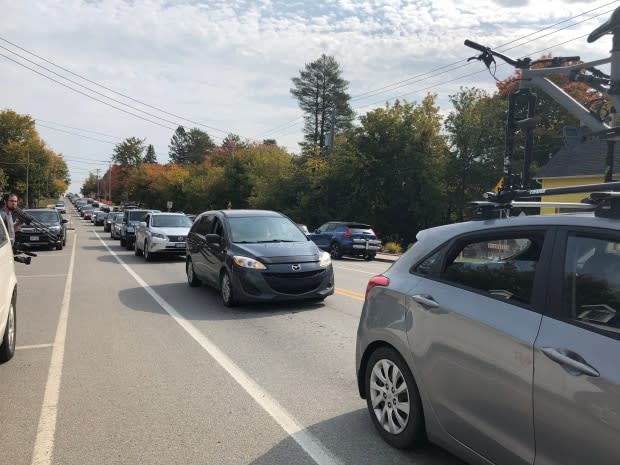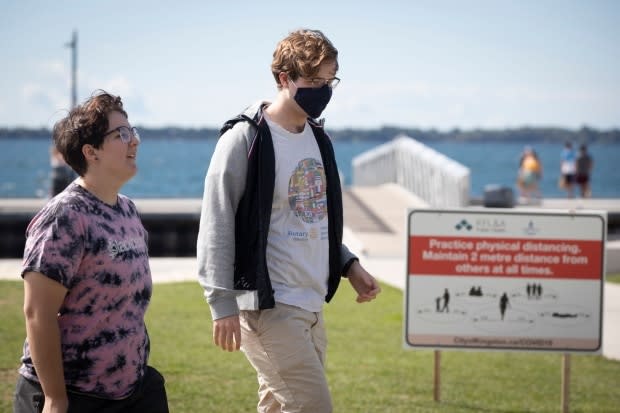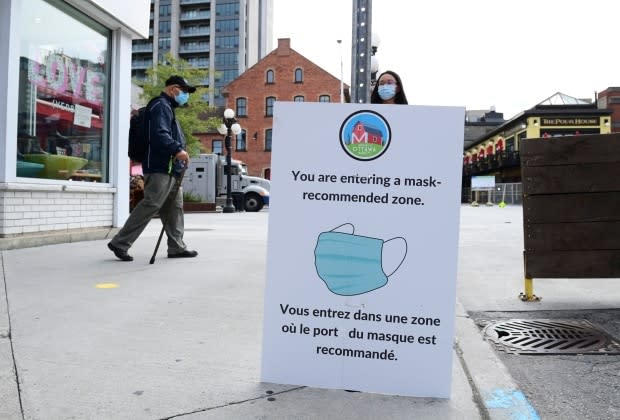What you need to know about COVID-19 in Ottawa on Wednesday, Sept. 30

Recent developments:
Ottawa's top doctor is urging residents to limit close contacts as the "alarming" rise in COVID-19 cases continues.
Ottawa Sports and Entertainment Group is cutting 40 per cent of its staff at TD Place, saying it's "the harsh result of a brutal pandemic."
The NCC has cancelled its Gatineau Park fall shuttle buses for the year.
What's the latest?
September ends with 64 new COVID-19 cases in Ottawa, capping off a record-breaking month — and what the city's medical officer of health called "an alarming increase."
Dr. Vera Etches urged residents Wednesday to stick strictly to a few close contacts, or risk letting the illness spiral out of control.
Two more people have died from COVID-19, while 19 patients are currently being treated in hospital.
The Ottawa Sports and Entertainment Group is cutting 40 per cent of its staff at TD Place, a move its CEO called "the harsh result of a brutal pandemic" as limits on gatherings continue to hammer the entertainment and sports industries.
Health Canada has approved the ID NOW rapid COVID-19 testing device, which promises results in 15 minutes without the need to send samples to a lab.
The federal government just announced Tuesday it would buy some 7.9 million of these tests.
The National Capital Commission has now cancelled its annual fall shuttle bus program to Gatineau Park to see the fall colours, saying it wants to discourage crowding in the park.

How many cases are there?
As of the most recent OPH update on Tuesday, 4,322 Ottawa residents have tested positive for COVID-19. That includes 685 known active cases, 3,350 resolved cases and 287 deaths.
Overall, public health officials have reported more than 6,500 cases of COVID-19 across eastern Ontario and western Quebec, with more than 5,100 of those cases considered resolved.
COVID-19 has killed 104 people in the region outside Ottawa: 52 people have died in Leeds, Grenville and Lanark counties, 34 in the Outaouais and 18 in other parts of eastern Ontario.
What's open and closed?
Some public health rules are being rolled back because of the second wave of the pandemic.
Ottawa and Kingston, Ont., public health officials are ordering anyone with symptoms or who has been identified as a close contact of someone who's tested positive to immediately self-isolate or face a fine of up to $5,000 per day in court.
Kingston has also tightened its distancing rules in city parks and increased fines.

Ottawa will resume ticketing drivers who park longer than allowed in unmarked areas and bring back public skating at five city arenas tomorrow
It's also closing the McNabb Arena respite centre for people without housing on Friday and expanding services at nearby support centres
As of Monday, visitors to long-term care homes in Ottawa will be restricted to staff, essential visitors and one or two caregivers only.
Private, unmonitored gatherings across Ontario are now limited to 10 people indoors and 25 people outdoors.
Quebec has introduced tighter restrictions in the province's "orange zones," which now includes the Outaouais.
WATCH | Experts call for earlier versions of social 'bubble':
Distancing and isolating
The novel coronavirus primarily spreads through droplets when an infected person coughs, sneezes, breathes or speaks onto someone or something.
People can be contagious without symptoms.
This means precautions such as working from home, keeping your hands and frequently-touched surfaces clean socializing outdoors as much as possible and keeping distance from anyone you don't live with or have in your social circle, including when you have a mask on.
Ottawa's medical officer of health is pleading with residents to reduce the number of people they're in close contact with as new cases of COVID-19 continue to surge, this week asking residents to see very few people they don't live with.
Masks are mandatory in indoor public settings in all of eastern Ontario and Quebec, including transit services and taxis in some areas.
Masks are also recommended outdoors when you can't stay the proper distance from others.

Anyone who has travelled recently outside Canada must go straight home and stay there for 14 days.
Most people with a confirmed COVID-19 case in Quebec can end their self-isolation after 10 days if they have not had a fever for at least 48 hours and has had no other symptom for at least 24 hours.
Health Canada recommends older adults and people with underlying medical conditions and/or weakened immune systems stay home as much as possible.
What are the symptoms of COVID-19?
COVID-19 can range from a cold-like illness to a severe lung infection, with common symptoms including fever, a cough, vomiting and the loss of taste or smell.
Less common symptoms include chills, headaches and pink eye. Children can develop a rash.
Getting tested any sooner than five days after potential exposure may not be useful since the virus may not yet be detectable, says OPH.
If you have severe symptoms, call 911.
Where to get tested
Wait times and lines have been long at many of the area's test sites, causing some to reach capacity before closing time or even before opening.
There have also been delays processing tests at laboratories.
Ontario health officials have said they're trying to add more test capacity.
WATCH | U of O student still waiting for contact-tracing call:
In eastern Ontario:
The Ontario government recommends only getting tested if you have symptoms, or if you've been told to by your health unit or the province because of your work.
Most of Ottawa's testing happens at one of four permanent sites, with additional mobile sites wherever demand is particularly high.
A test clinic is expected to open at the Ray Friel Recreation Complex in Orléans, likely by mid-October.
People without symptoms, but who are part of the province's targeted testing strategy, can make an appointment at select Ottawa pharmacies.
WATCH | Focus on targeted lockdowns if needed:
In the Eastern Ontario Health Unit, there are drive-thru centres in Casselman and Limoges and a walk-up site in Hawkesbury that doesn't require people to call ahead.
Its medical officer of health says the Casselman centre will be moved to reduce its impact on traffic.
Others in Alexandria, Rockland, Cornwall and Winchester require an appointment.
In Kingston, the city's test site is now at the Beechgrove Complex near King Street West and Portsmouth Avenue.
Napanee's test centre is open daily for people who call ahead.
People can arrange a test in Bancroft, Belleville, Picton or Trenton by calling the centre. Only Belleville and Trenton run seven days a week and also offer online booking.
The Leeds, Grenville and Lanark unit has walk-in sites in Kemptville and Brockville.
There are permanent testing sites in Smiths Falls and Almonte which require an appointment, along with pop-up sites by appointment in Carleton Place today and Perth Friday.
Renfrew County residents should call their family doctor. Those without access to a family doctor can call 1-844-727-6404 for a test or if they have health questions, COVID-19-related or not.
People can also visit the health unit's website to find out where testing clinics will be taking place each week.
In western Quebec:
Outaouais residents can make an appointment in Gatineau seven days a week at 135 blvd. Saint-Raymond or 617 avenue Buckingham.
They can now check the approximate wait time for the Saint-Raymond site.
There are recurring clinics by appointment in communities such as Gracefield, Val-des-Monts and Fort-Coulonge.
They can call 1-877-644-4545 if they have other questions, including if walk-in testing is available nearby.
Tests are strongly recommended for people with symptoms or who have been in contact with someone with symptoms. People without symptoms can also get a test.
First Nations, Inuit and Métis:
Akwesasne has had 14 confirmed COVID-19 cases, most linked to a gathering on an island in July.
It has a mobile COVID-19 test site available by appointment only.
Anyone returning to the community on the Canadian side of the international border who's been farther than 160 kilometres away — or visited Montreal — for non-essential reasons is asked to self-isolate for 14 days.
Inuit in Ottawa can also call the Akausivik Inuit Family Health Team at 613-740-0999 for service, including testing, in Inuktitut or English on weekdays.
People in Pikwakanagan can book an appointment for a COVID-19 test by calling 613-625-2259.
Anyone in Tyendinaga who's interested in a test can call 613-967-3603 to talk to a nurse.
For more information


